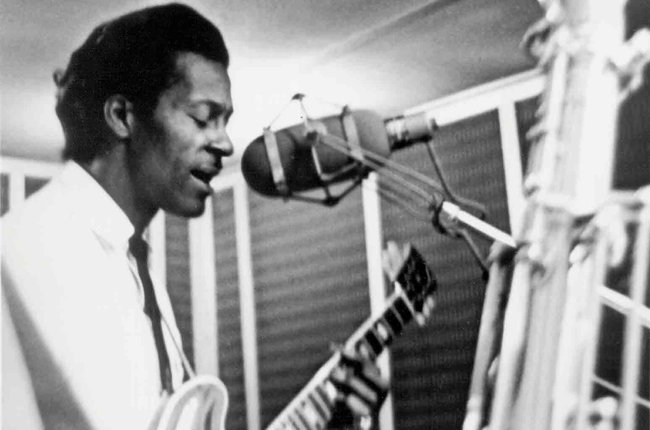The history of rock’n’roll is littered with tales of pioneers who got scalped -- by their managers, their record labels and their accountants, among others. Chuck Berry was not one of them.
After learning some hard lessons early in his career, Berry, in his own eccentric way, mastered the music business well enough to leave an estate that Billboard estimates controls more than $17 million in music assets. The estate’s share of publishing rights to songs controlled by the late rocker’s Isalee Music Publishing Company could be worth more than $13 million alone, and Berry’s recording-artist royalties could amount to $500,000 per year.
Berry’s introduction to the treacherous complexities of the music industry came shortly after he signed with Chess Records. He also signed a contract with Arc Music, the music publishing company owned by Leonard Chess, one of two brothers who ran Chess Records. Only when Berry received his first royalty statement did he discover that co-writer credits for his first hit, “Maybellene,” had been given to radio DJ Alan Freed, who gave the song extensive airplay and who was a business associate of the Chess brothers.

“I didn’t understand most of the terms of arrangements of publishing,” Berry wrote in his 1987 memoir, Chuck Berry: The Autobiography. “I didn’t know that a person got compensation for writing as well as recording a song.”
“Like many other artists of that era, [Berry] felt taken advantage of early on and became much more knowledgeable about the contracts he was signing,” says Gary Pierson, the lawyer who has handled the artist’s music affairs for the last two years. Berry also adopted a series of idiosyncratic checks and balances to make sure he was paid his due. Rather than tour with a band and equipment, he often played with local musicians. He employed tour riders that imposed penalties when promoters didn’t follow his requests to the letter; and he often insisted on being paid in cash. Sony Music Entertainment chairman Doug Morris says he had to pay the singer in hard currency when he signed him to the Atco record label in the late ’70s; and Berry famously insisted on being given $2,500 in a paper bag before he would appear in Hail! Hail! Rock ’N’ Roll, a concert film celebrating his 60th birthday.
But these anecdotes obscure his business savvy. Adhering to one of his mother’s sayings -- “Don’t let the same dog bite you twice” -- Berry negotiated better recording contracts after his initial experience with Chess, to the extent that he received a check for $250,000 in artist royalties for his only Billboard Hot 100 No. 1, 1972’s “My Ding-a-Ling” ($1.5 million in today’s currency). He also invested hundreds of thousands of dollars in real estate, including Berry Park, his 30-acre compound in Wentzville, Mo.
“He negotiated a lot of contracts for himself,” says Martin Green, a litigator who represented Berry over several decades. “He handled more of his own business than most musicians could.” Berry earned a sizable sum on the road, as well. According to Bob Baldori, another attorney who worked for Berry and gigged with him as a pianist, the rocker played close to 100 shows a year in the ’80s and ’90s, making $20,000 to $35,000 per concert.
Baldori estimates the value of Berry’s estate at $50 million -- “conservatively.”

Berry wrote about 200 songs during his career, and his estate will now own about half of them outright, albeit mostly ones he wrote after his commercial peak. Universal Music Group, which owns the Chess catalog, controls Berry’s most valuable recordings, while BMG and Berry's Isalee Music control the music publishing.
Berry’s publishing rights could generate about $360,000 per year in mechanical and performance royalties in the United States from his own recording and covers, and closer to $500,000 with international royalties. Meanwhile, publishing income from his songs could amount to $1.1 million annually. Should the estate sell Berry’s publishing rights, such catalogs are generally priced at about 12 times annual revenue, which in this case would be $13.5 million.
“We’re addressing all of those things going forward,” says Pierson, “in terms of who our partners will be.”
This article appears in the April 1 issue of Billboard.








